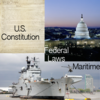Federal System Judicial Review Flashcards
Article III, section 2, of the Constitution limits the jurisdiction of the Federal Courts to?
Limits of Federal Jurisdiction
Law-Based Federal Jurisdiction
+
Party-Based Federal Jurisdiction
What limits the jurisdiction of Federal Courts?
Article III, section 2 of the United States Constitution limits the jurisdiction of Federal Courts.
What are the (3) Law-Based sources of Federal Jurisdiction?

What are the 5 Party-Based sources of Federal Jurisdiction?
The Federal Courts have jurisdiction over any cases involving:
- The United States Government as a party;
- State v. State action;
- State v. Non-State citizens;
- Citizens of Different States + >$75k in controversy; and,
- Foreign Diplomats.
Define what the 11th amendment prohibits?
11th Amendment
Private individuals cannot sue the States (does not include city of counties nor state officials) for money damages in any court (injunctions are not barred).
More information: 11th Amendment
When does 11th amendment allow private citizen to seek money damages from a state?
Private v. State Suits Allowed
Congress can use its enforcement powers to authorize private suits against states for damages for violation of 13th, 14th, and 15th amendments.
What steps should you take in examining a claim’s case and controversy requirements?
RAMPS
If claim fails any of requirements, the claim will not be heard.
R. Is the case ripe?
A. Will the court invoke abstention?
M. Is the controversy moot?
P. Does the claim involve an non-judiciable political question?
S. Does the party bringing the claim have standing to bring the claim?
What are the elements required for a party to have standing to bring a suit?
Standing
Injury: the claimant must have suffered an actual or imminent personal injury
(≠ legislator, constitution lover, taxpayer)
+
Causation: The defendant’s conduct must have caused the claimant’s injury
+
Remedy Available: Litigation of the claim must remedy or benefit the claimant
When does a taxpayer have standing sufficient to bring a lawsuit?
A taxpayer has standing anytime there is a law violating the establishment clause.

What are the steps for analyzing if a third party has standing?
Third Party Standing
- There is a special relationship between the plaintiff and the third party such that the plaintiff’s interest is connected to the third party’s constitutional rights; and,
- There is incapacity of the plaintiff.
* More Information*: Third-Party Standing
What are the steps for analyzing whether an organization has standing?
- Member Standing: would members have standing to sue as individuals;
- Purpose of the Association: does the association have a purpose related to the interest by the suit; and,
- Member Participation Not Required: the litigation must not require a particular member to bring the suit (ask: will the same remedy address all their claims).
Define when a lawsuit is ripe?
A lawsuit is ripe when the plaintiff has an actual injury
Why will a Federal Court refuse to hear the case if a suit is not ripe?
The a Federal Court will not hear a non-ripe case because the Federal Court does not issue advisory opinions.
Define when a legal dispute becomes moot?
A lawsuit is moot when when it is too late for a court to give remedy to avoid the harm.
What is the exception to a case being moot?
A case will not be moot when there is a injury capable of repetition that is evading review. A case will not be moot if the injury has the ability happen over and over again.


